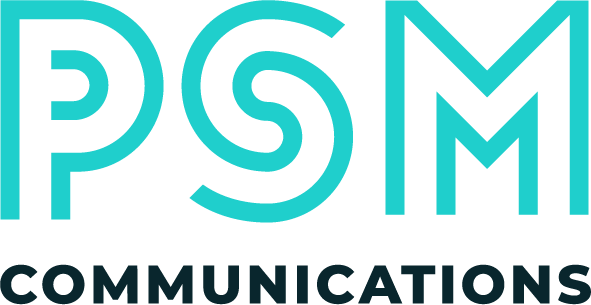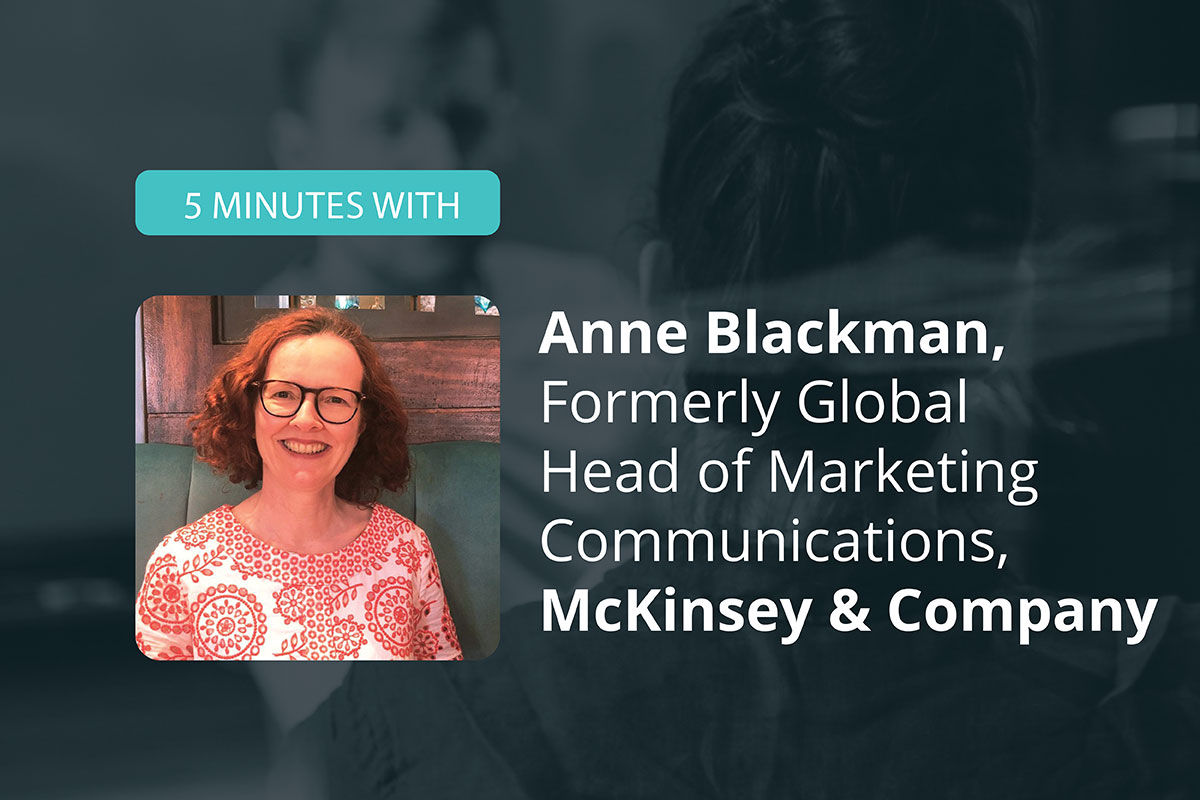This month I’m delighted to be speaking to Anne Blackman, an experienced marketing leader, who has worked for a number of the world’s leading consulting and legal firms.
Here’s her 5 minutes with…
Anne, let’s start by you sharing with our readers your marketing background?
I worked in the TMT sector at three Fortune and FTSE companies on the consulting side of these businesses. I was made redundant when the dot-com bubble burst and received some great outplacement advice. This identified the experience and skills I had built up in my work marketing IT consultants (trusted advisors to chief technology officers) which would allow me to build a career in legal marketing, one I could successfully transition to at a time when law firms were beginning to get serious about their marketing. From there, I have worked at three law firms (DLA Piper, Linklaters, Freshfields) and the management consultancy McKinsey & Company.
You’ve worked in professional services for many years, what have been the biggest changes in marketing in recent years?
I think, marketing has moved up the value agenda at Professional Services Firms (PSF). Understanding is growing at different rates of what each of its elements brings, be that brand, communications, content, campaigns, sector-based marketing, client management programmes, business development, marketing tech, and other elements I may have left out.
Another interesting development is the rise of digital marketing. We certainly see more sophisticated websites, infographics, interactive content than we used to. We have seen enhanced social media presence of firms and individuals. A recent development that I hope is fully realised is the understanding that digital marketing is not something separate from traditional marketing but should be integrated into it.
I have also noticed a democratisation of marketing—it is not just for partners any more there are ways for others to be involved. Where marketing teams are contributing is in advocating for this, setting up processes, frameworks, training, and coaching to make it possible.
You’ve rolled out many successful campaigns throughout your career, what has been your favourite and why?
I have designed several campaigns for partners who have authored books. They are good to work on as the partner authors are so personally invested in them. They offer a chance to collaborate with people you don’t normally work with and get a glimpse into other marketing worlds. Like PR agencies who only have authors as clients, book agents, and publishing teams like Bloomsbury, Harvard Business Press, and Wiley.
Another favourite is an educative campaign launched when greater responsibility for regulation was coming, but not understood, so not being effectively managed. At its heart was a survey run with the London School of Economics. Then working with a third party was unusual in law. The findings were launched in a report. The Financial Times legal correspondent was given an exclusive—which resulted in a half page story. A summary of the report was enclosed in 60,000 copies of the FT the day the story ran. We created national – and sectoral – media stories, a direct mail campaign, webpages, and client events. To keep momentum up a newsletter was launched, a second direct campaign run, events held looking more closely at specific client situations, and there was ongoing media work. In terms of outputs there was an initial spate of articles, media interest in the practice grew with several new journalist relationships built, and the practice received many invitations to speak at high profile conferences. In terms of outcomes, practice revenue grew 30% in the year following the survey and the press coverage was calculated to have been worth several million pounds in advertising spend.
When I started working on a campaign about how organisations could respond to the pandemic in 2020 I had little thought it would become the dynamic and omnipresent set of campaigns it did. It moved from helping organisations deal with the immediate crisis, to dealing with remote working as a norm when no end was in sight to the crisis, to the return to work under hybrid conditions, to dealing with the great attrition, and more. Micro-campaigns emerged as offshoots to the main campaign. Some business-as-usual marketing became mini campaigns in themselves as they had to be run virtually. As with the campaigns above this work used all aspects of the marketing mix, with the added challenge/opportunity of managing remotely. Balancing scale, timing, quality, coverage, phasing, and integration all have a part to play in a great campaign. As does a sense of humour, common sense, and patience. So any campaign where I can use my experience, skills, and background to deliver great content and thought leadership will be a favourite of mine.
Many of your roles have been in global in nature, what are the keys to success in rolling out campaigns globally?
When rolling out campaigns begin by acknowledging that you are in a global organisation trying to communicate to various colleagues and clients with their own culture and business norms. Set campaign objectives remembering it is fine to decide not to be all things to all markets. This can help a lot because from the objectives and the positioning comes the tactical roll-out plan and with clear objectives it will be smoother. For example if the campaign is going to be survey based where are you going to collect data and in what volumes?
Even if there is no expectation of anything happening in a local market, tell colleagues about any global aspects of the campaign, for example if you are going to take over the front page of the website, or the firm showcase page on LinkedIn, as they will get questions from local colleagues who will see it.
Create a campaign toolkit (key messages, talking points, press release template, event-in-a-box etc.) that can be sent to colleagues in other markets for them to adapt and translate for their own use. Try to give them as much notice as possible as they will need to plan anything they are going to do for the global campaign with whatever is going on locally.
However, don’t get too hung up on launch day. It is hardly ever necessary for everything in a campaign to happen the same day, or even week. In some instances it can be a real positive for there to be a second or third wave of campaign activity in another market after the campaign first launched.
Which brings me to another point give campaigns time and don’t be afraid to repeat elements of them as these LinkedIn posts detail:
It is also worth remembering that a global campaign can be run out of anywhere, for example if partners in a specific country are launching a book or writing about their country’s future relations with India. So one day you might be able to use their experience and toolkits.
It might also be worth admitting that there is an organisational tension between global/corporate so being aware and accepting of this can help, so can as much early discussion as possible about campaigns, sharing toolkits with an open mindset of letting local colleagues decide how and when to use them as they see best, and seeing a second or third wave of campaign activity as a positive.
To succeed in professional services marketing, you need more than technical (skills) capability, what to you are the most important soft skills that you think are needed to be successful?
In no particular order, here are the essential qualities: patience, a sense of humour, common sense, an appetite for doing things to a formal and high-quality standard, a liking for getting into the detail, intellectual curiosity, a love of language and words and how they work together, high levels of comfort with ambiguity and complexity, empathy, effective communication, adaptability, resilience, the ability to multi-task, and problem-solving skills.
Where do you think professional services marketers, in general, are on that journey?
I think the majority of PSF marketers do well against the many demands put on them. Most show themselves to have many of the skills listed above. It is worth noting what they are reacting to changes frequently— evolving client expectations regarding service levels and pricing, the emergence of new technologies, and shifts in partnership dynamics due to leadership transitions within the firm or specific practice areas, or sector groups.
Looking forward, what do you think is likely to shape the future of professional services marketing?
I think professional services firms will see more use of technology, such as generative AI, and a growing reliance on data and analytics to drive decisions. I think we will see AI, privacy, data use better regulated so that will have implications for how firms operate.
In their personal lives clients are experiencing more personalisation so they will come to expect it from their professional services firms.
Environmental, Social, and Governance and Diversity, Equity, and Inclusion have been driving debate and client demands of their firms for a while now and will continue to do so even as their underlying meaning changes.
Hybrid working in some form looks set to stay and that is a challenge firms need to address.
There seems to be a blurring of the services firms offer with non-consulting professional services firms moving towards offering consulting advice. How that will play out will be interesting to see.
Thinking back over your career to date, what’s the best piece of marketing advice you’ve ever been given?
“Anne remember while few can write, everyone can edit. If you are going to stay in marketing you should remember that.” That goes double for my time in professional services marketing. The advice pops into my mind a couple of times most weeks.
And finally, what one piece of advice would you give to a high-potential professional services marketer looking to step into their first leadership role?
Stay calm. Cultivate resilience. Build strong relationships with your team and colleagues. Take your time (don’t buy into the first 90 days trope in professional services firms it is likely at least the first year). Start small but with high production values. Take metrics on what you do, learn from them, scale from there. Learn creatively – from inside and outside your firm and our sector.

